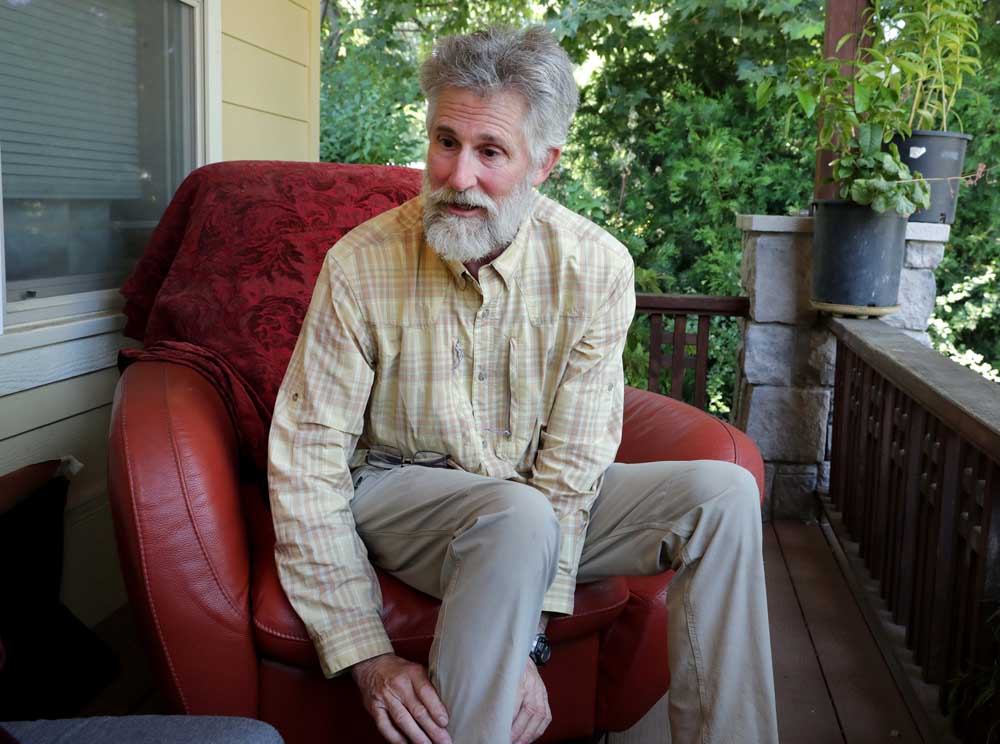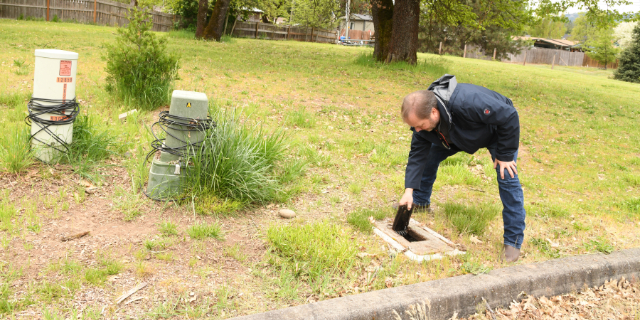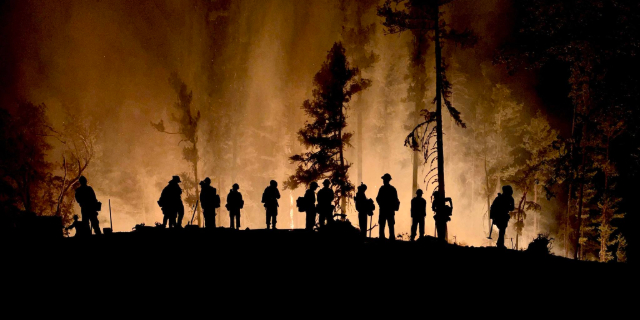At 64, Pacific Crest Trail hiker takes the long view
Published 10:45 am Friday, July 28, 2023

- Eric Rupp, 64, relaxes in Talent as he works to overcome some foot and ankle injuries that needed tending before he resumes his thru-hike on the Pacific Crest Trail.
Eric Rupp turned 64 on the Pacific Crest Trail last month, and although persistent pain in his feet compelled him to stop in the Rogue Valley this week for medical treatment and rest, he has no intention of giving up his hike from Mexico to Canada.
“I’m way past my thru-hiking prime,” the Central California resident noted Tuesday, smiling through a voluminous silver beard.
Monday morning, Rupp — rail thin and standing 6 feet tall — received cortisone injections in both Achilles tendon heel attachment points.
Rupp was at Crater Lake last weekend when he realized he needed to stop and reckon with his own determination. His trail friends had outpaced him and left him behind. In Medford, he knew he could go to an urgent care center and get some help.
Tuesday afternoon, Rupp sat on the porch of a trail angel’s home in Talent. Trail angels are people who perform various acts of kindness for PCT hikers, from supplying food to giving rides and sometimes opening their homes.
Leaning back into a sumptuous red leather chair beneath shady trees, Rupp reflected on what’s driving him to hike a 2,647-mile trail in his golden years.
He isn’t a stranger to long-distance adventure. In 1982, he traveled from San Francisco to New York by bicycle in 57 days, then created a Kodachrome photography show from the trip. But after a decades-long lull from adventures of this kind, the spark was rekindled from the sky. At home in Central California, Rupp enjoys flying sailplanes, a type of glider aircraft.
“You’re flying with hawks and eagles all the time. Traveling long distances, 12 hours in the cockpit sometimes,” he said.
From hours and hours in the sky soaring over the Sierra Nevada, Rupp developed a desire to “see it from down there,” he said.
On April 7, he took the first step of many where the PCT begins on the Mexican border just outside the unincorporated community of Campo, California. There were crowds then, he said. But by the time he reached Northern California, he often hiked for miles without seeing another soul.
The average hiker takes about five months to complete a thru-hike, according to the Pacific Crest Trail Association website. The average cost to hike the trail is between $8,000 and $12,000 for gear and stops in towns along the trail for recreation, rest or medical reasons.
The association does not have exact numbers of how many thru-hikers attempt to hike the entire trail each year, but it does collect self-reported data from hikers. In 2022, 856 people reported a completed thru-hike.
“Roughly the same number of people have completed the PCT that have stood on the summit of Mount Everest,” said Scott Wilkinson, content development director for the association.
Hikers most commonly come to the trail at three stages of life — immediately after graduating college, when they retire, or when middle-aged people lose their jobs and need a break from normal life, Wilkinson said.
Over the past few years, the trail has begun to see increasing numbers of inexperienced hikers, Wilkinson said, but lack of experience or training doesn’t necessarily affect success. Sometimes muscle-bound, specially trained military veterans report giving up after 300 miles, and sometimes overweight, green hikers complete the entire trail, he said.
“Some of it’s luck, genetics — a lot of it is mindset. How bad do you want it? It’s resilience, you’ve got to be resilient,” he said.
Other hikers — most of them much younger — have been encouraging, Rupp said, reflecting on his journey. When he lamented to trail companions he would have to slow his pace after struggling to keep up walking over 20 miles a day, another hiker prompted Rupp to reorient his perspective.
“I had someone tell me, ‘Man, you’re 64 and you’re complaining about only being able to hike 18 miles a day?’” he said.
His steady pace earned him his trail name, Slow Burn.
There are some benefits to hiking as an elder. Decades of experience in introspection and self-improvement have earned him mental toughness and emotional flexibility, Rupp said. It has been difficult, he said, to watch younger and fitter hikers succumb to negativity, drop out and give up.
“Even though it’s a little brutal, long, sometimes boring, you have to be in charge of your own happiness,” he said.
There are also practical benefits to hiking at a mature age.
As the chief executive officer of a small company — Laundry Care Express — Rupp was able to divide his various duties among employees and leave work for his quest. Like many older adults, he also has more financial freedom than he did as a young man, allowing him to buy new ultra-lightweight gear that he believes is essential to thru-hiking at his age.
Less weight makes it easier, he said. He has taken ultra-light to a spartan extreme by carrying minimal supplies. He pointed to the plaid shirt and zip-off hiking pants he was wearing as his only set of clothing aside from long johns, some socks, a sun hat and a beanie. He also eschews carrying a camp stove. No stove means no hot dinners, but it also means he doesn’t have to carry fuel, a skillet or other cooking gear.
“I just pour some water into a foil bag of dehydrated food,” he said.
While other campers are busy setting up their cooking apparatus and making dinner, Rupp enjoys the time to reflect. Minimal gear means a clearer mind, he said, describing the elimination of anything but absolute essentials as “cathartic.”
Walking for as long as it takes has created an interesting break from normal reality. The trail has become to him in a way endless, he said, because no end is definitely defined. Through hours of hiking alone, sometimes he listens to music or audiobooks to distract himself from the drudgery. Sometimes, he said, as he walks and lets his mind wander he is overcome with the beauty of the terrain.
But the beauty isn’t limited to the wilderness. Without the normal constraints of hurried daily life, hikers take the time to get to know each other and be genuine. The human kindness on display has been compelling, Rupp said. Strangers are constantly helping each other, from trail angels to hikers and people who live near the PCT coming out to clear debris and maintain the trail for no reason but altruism.
“In this day and age, it’s so easy to be cynical about society and all that. … I always thought you meet people who work hard and you can trust ’em as far as the day is long. You see that on the trail,” he said.
Rupp plans to go back to the trail Saturday where he left it at Crater Lake. He hopes to reach the Canadian border by September. Even a single day’s break can make it difficult to get back to the grueling days of hiking, he said, and he expects his return to the trail after a week’s rest will be difficult.
When asked what advice he has for those who worry whether they could hike the PCT, his response was quick — “Just do it.” He also recommended going ultra-light and using social media to get to know the gear and the trail.
Correction: This article has been corrected to state Rupp is from Central California, the article originally incorrectly stated he was from Southern California. It has also been corrected to state he intends to reach the end of the trail by September, not Halloween as the article originally incorrectly stated.






